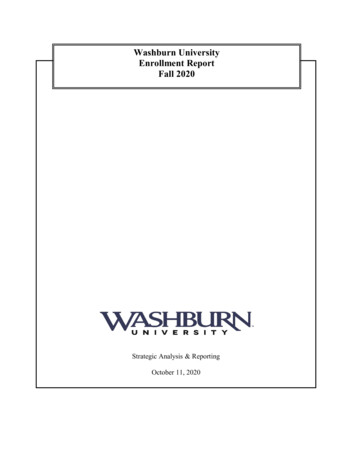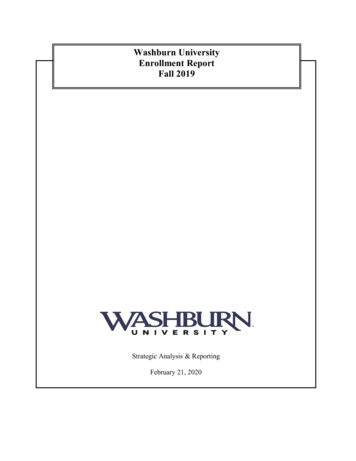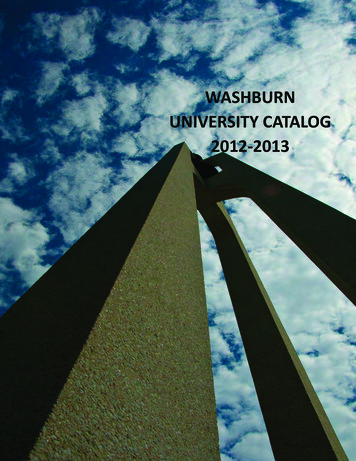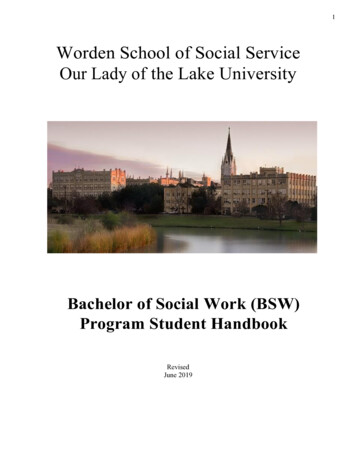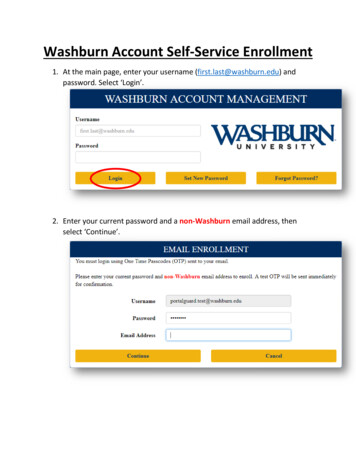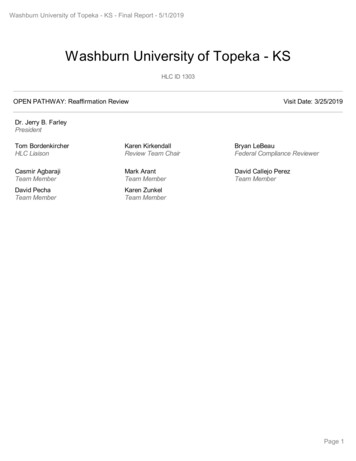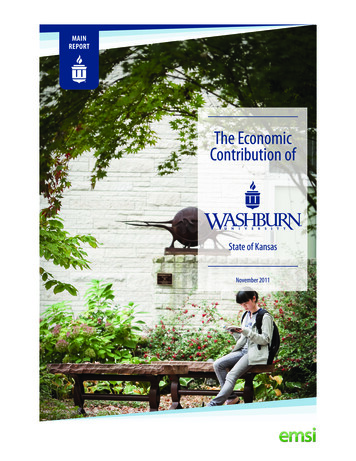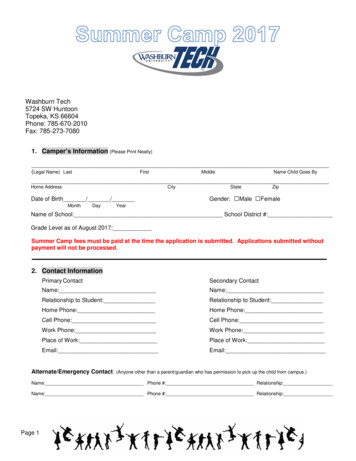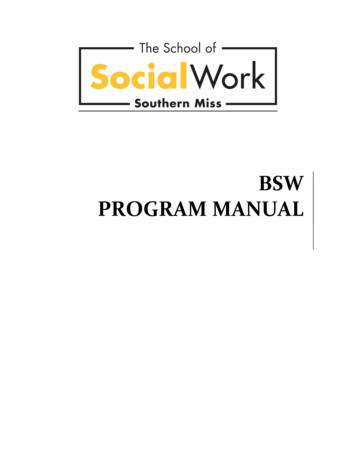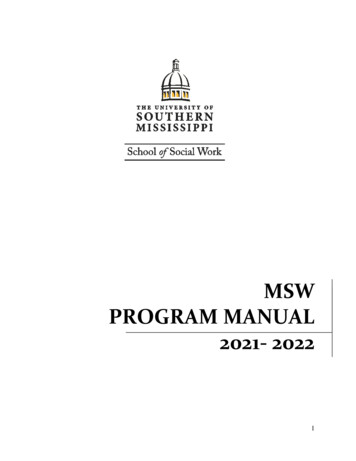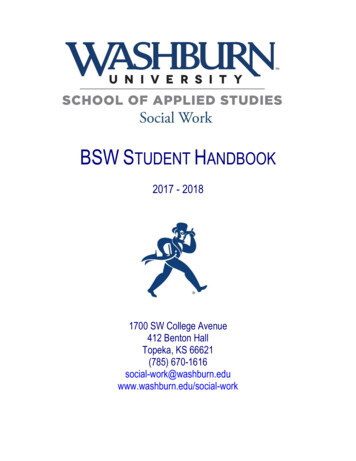
Transcription
BSW STUDENT HANDBOOK2017 - 20181700 SW College Avenue412 Benton HallTopeka, KS 66621(785) ocial-work
In planning your course of study, you should become familiar with the BSW Student Handbook and theWashburn University Undergraduate Catalog. This Handbook introduces the Department of Social Workgoals and corresponding BSW Program goals and objectives. It serves the following purposes: Introduces students to the social work program.Serves as a resource in planning course work.Articulates the policies and procedures of the program.Describes the activities and opportunities provided by the program.As professionals in training, students are responsible for learning and understanding the purpose andvalues that guide the social work profession. Students are therefore strongly encouraged to read theNational Association of Social Workers (NASW) Code of Ethics, which is on the NASW web site,www.socialworkers.org. This document, available in both English and Spanish, will be used throughout thecurriculum. Students are also strongly encouraged to become members of at least one of a number ofprofessional social work associations, such as the National Association of Social Workers and theWashburn University Student Social Work Association.Washburn University maintains a policy that assures equal educational opportunity without regard to age,class, color, culture, disability, ethnicity, family structure, marital status, national origin, political perspective,race, religion, sex, sexual orientation, gender, gender identity, and/or expression.NOTICEBecause changes may be necessary from time to time, this document should not beconstrued as creating a contract between the Social Work Department and anyperson. The Social Work Department reserves the right to make any changes deemednecessary at any time in its policies, practices, academic programs, courses,schedules or calendars. This includes the right to correct clerical or typographicalerrors in any/all of its printed and/or online documents. Matriculation at the Universityand in the Department of Social Work is a privilege and not a right. The Social WorkDepartment reserves the right in its discretion to separate any student who does notmeet academic requirements or who does not maintain acceptable standards ofconduct or character consistent with the values and ethics of the social workprofession.1
CONTENTSWASHBURN UNIVERSITY SOCIAL WORK PROGRAM . 5Social Work Department Mission . 5BSW Mission. 5BSW Program Goals . 5THE BSW PROGRAM . 6Licensure Eligibility. 6Program Accreditation. 6Declaring Social Work as a Major . 7DEPARTMENT DEFINITIONS OF GENERALIST PRACTICE AND OTHER KEY TERMS . 7Ecological Perspective . 7Empowerment . 7Critical Thinking . 7Generalist Practice . 8BSW ADMISSIONS . 8BSW Program Admission Policy Statement . 8Requirements for Formal Admission to the BSW Program and the Field Practicum . 8Termination of Formal Admission to the BSW Program . 9Financial Assistance . 9New BSW Student Online Orientation. 9Washburn Transformational Experience . 9BSW Department Honors. 10Criminal Record . 10BSW DEGREE REQUIREMENTS. 10Bachelor of Social Work (BSW) Degree Requirements . 10BASIC REQUIREMENTS AND GENERAL EDUCATION REQUIREMENTS . 11Basic Requirements . 11Online and Web-Assisted Courses . 12SEQUENCE OF COURSEWORK . 12Registration/Enrollment . 13Academic Advising and Student Development . 13Academic Advising Guidelines for Social Work Students . 14GRADUATION . 15Application for Graduation. 15Commencement. 15PRACTICUM AND SEMINAR. 15Objectives for Practicum . 16Practicum Roles and Responsibilities . 16Washburn University . 16Director of Practicum and Field Coordinators . 16Seminar Instructor and Field Liaison . 17Agency . 17Field Instructor . 17Students . 18Assigning Students . 19Placement Interviews . 192
Final Assignment . 19Employment-Based Placements . 20Parallel Placements . 20Safety and Security of the Student in Practicum . 20THE PRACTICUM EXPERIENCE . 21Development of the Learning Contract. 21Monitoring the Field Practicum Experience . 21Seminar and Practicum Communication . 22Evaluating the Practicum Experience. 22Remediation in Practicum . 23ADDITIONAL PRACTICUM POLICIES . 23Practicum Seminar . 23Practicum Hours . 24Holidays, Breaks, Personal Leave . 24Grading Policy. 24Grievances Regarding Field Placement . 24Termination of a Student from a Field Placement . 25STUDENT RIGHTS, RESPONSIBILITIES, AND SERVICES . 26Equal Opportunity Policy . 26Disability Services . 26Center for Student Success . 26Washburn Student Social Work Association . 26Academic Integrity and Honesty . 27Courtesy Expectations . 27Confidentiality . 28National Association of Social Workers (NASW) Code of Ethics . 28Desire2Learn Training. 28Required Subscription to Taskstream . 28Attendance and Class Participation . 29Communications and Official E-Mail Address . 29Writing and the APA Style . 29Inclement Weather Policy . 30Ichabod Shop (University Bookstore) . 30iCard . 30Library Services . 30Computer Labs . 30No Smoking Policy . 30Instructor Availability . 30Instructor/Course Evaluation . 31Social Work Department Program Evaluations . 31Campus Police . 31Job Placement Assistance . 31ACADEMIC RETENTION AND TERMINATION . 32Grading Policies . 32Academic Probation . 33Incomplete Grade . 33Course Withdrawal . 33Withdrawal from the Program . 333
Grade Appeal Procedures. 34Revocation of Formal Admission to the BSW Program . 34Student Program Status Appeals Policy . 34Academic Dismissal Procedures . 36Appeal of Academic Dismissal . 36COURSE OFFERINGS . 37SW 100 Introduction to Social Work and Social Welfare (3) . 37SW 250 Generalist Social Work Perspectives (3) . 37SW 325 Micro Human Behavior and the Social Environment (3) . 37SW 326 Macro Human Behavior and the Social Environment (3) . 37SW 350 Social Policy and Programs (3) . 37SW 352 Micro Social Work Practice (3) . 37SW 353 Macro Social Work Practice (3) . 37SW 425 Pre-BSW Practicum Workshop (0) . 38SW 354 BSW Seminar and Field Practicum I (6) . 38SW 355 BSW Seminar and Field Practicum II (6) . 38SW 361 Independent Study (1-3) . 38SW 362 Generalist Quantitative Research (3) . 38SW 363 Generalist Qualitative Research (3) . 38SW 390 Contemporary Issues in Social Work (3) . 38SOCIAL WORK FACULTY . 39APPENDIX A – ADVISING REGISTRATION FORM . 41APPENDIX B – BSW ADVISING SHEET . 42APPENDIX C – PROCESS OF COMPLETING BSW DEGREE . 44APPENDIX D – TERMS OF INTEREST TO SOCIAL WORK STUDENTS. 45APPENDIX E – GUIDELINES FOR BSW HONORS . 46APPENDIX F – NASW CODE OF ETHICS . 49APPENDIX G – CSWE EDUCATIONAL POLICY AND ACCREDITATION STANDARDS . 50APPENDIX H – Potential BSW Practicum Sites . 514
WASHBURN UNIVERSITY SOCIAL WORK PROGRAMSocial Work Department MissionThe mission of the Department of Social Work at Washburn University is to prepare students for thecompetent and ethical practice of social work via systematic attention to the core multidimensionalcompetencies established by The Council on Social Work Education. Through teaching, service, andresearch, the department is dedicated to enhancing the psychosocial functioning of social work clients andto improving the functioning of social systems, with particular attention to the needs of Topeka and thesurrounding region.BSW MissionThe mission of the BSW Program at Washburn University is to prepare students for the competent andethical practice of social work within an entry-level generalist model, via systematic attention to the coremultidimensional competencies established by the Council on Social Work Education. The program iscommitted to providing a respectful, supportive approach to learning, while maintaining high academicstandards. In so doing, the BSW Program is systematically linked to the core values of the social workprofession.BSW Program Goals1. Prepare students to provide competent and ethical generalist social work services, includingassessment and evaluation, prevention, intervention, and referral services to individuals,families and groups whose functioning is affected by biological, psychological, or social stressor impairment.2. Provide educational opportunities to students who represent diversity in all its aspects,including those who may have been educationally disadvantaged.3. Provide an educational environment for students that is supportive and based on humanisticprinciples.4. Provide a program that is integrated with the community, and meets the employment demandsfor generalist-level social workers within the region.BSW Outcomes: Meeting the Core Competencies of The Council on Social Work Education1.2.3.4.5.6.7.8.9.Demonstrate Ethical and Professional BehaviorEngage Diversity and Difference in PracticeAdvance Human Rights and Social, Economic, and Environmental JusticeEngage in Practice-informed Research and Research-informed PracticeEngage in Policy PracticeEngage with Individuals, Families, Groups, Organizations, and CommunitiesAssess Individuals, Families, Groups, Organizations, and CommunitiesIntervene with Individuals, Families, Groups, Organizations, and CommunitiesEvaluate Practice with Individuals, Families, Groups, Organizations, and Communities5
THE BSW PROGRAMThe BSW Program is designed to prepare social work students for professional generalist practice. Thisinvolves the application of an eclectic knowledge base, professional values, and a wide range of skills totarget systems of any size, for change within the context of four primary processes. First, generalistpractice involves working effectively within an organizational structure and doing so under supervision.Second, it requires the assumption of a wide range of roles. Third, generalist practice involves theapplication of critical thinking skills to the planned change process. Fourth, it emphasizes clientempowerment. In this regard, social workers utilize their knowledge and skills to assist individuals, families,groups, communities and organizations to improve their social functioning, obtain the resources needed toaccomplish identified goals, or effect social change to eliminate social and economic injustice. Theframework for accomplishing these goals is centered in competent assessments of the person-in-theenvironment, and the subsequent skillful selection of multilevel interventions, in keeping with social workvalues and ethical practice.Careers in social work occur in a variety of settings, such as public/state social services, hospitals, schools,mental health agencies, courts, nursing homes, crisis centers, and children and family service agencies.Career options include direct practice with clients, administration, social planning, and legislative advocacy.The BSW program is typically completed in four years by full-time students. Some students complete theprogram in shorter or longer periods of time. Two lower division courses, SW 100 Introduction to SocialWork and Social Welfare and SW 250 Generalist Social Work Perspectives, are recommended for thefreshmen or sophomore year. Foundation theory and skills courses may then be completed in thesophomore and junior years. The culmination of the BSW program is the Field Practicum Placement. Twopracticum courses, SW 354 & SW 355, are required for majors, in which students develop their social workpractice skills in a social services agency, under the direct supervision of a licensed social worker that isarranged by the Field Practicum Office. A pre-practicum one-day course, SW 425, is also required prior tothe beginning of the field practicum.Specific goals, objectives, and outcomes for individual courses are available to students for review in theDepartment of Social Work's office, or from the respective faculty member responsible for an individualcourse or sequence.Licensure EligibilityAll graduates of the BSW program are eligible to pursue licensure at the baccalaureate level (LBSW) in theState of Kansas and in other states that require social work licensing or registration at the baccalaureatelevel. This licensure is necessary for the practice of social work, and satisfactory completion of a CSWEaccredited social work program is necessary to be eligible for the LBSW (requirements vary from state tostate).Program AccreditationWashburn University's BSW program is fully accredited by the Council on Social Work Education (CSWE).Students are also encouraged to review the Educational Policy and Accreditation Standards for social workdegree programs as set forth by the CSWE. The full text of the CSWE Policies is available athttp://www.cswe.org.6
Declaring Social Work as a MajorIt is the policy of the Washburn University Department of Social Work to assure equal educationalopportunities to qualified individuals without regard to age, class, color, culture, disability, ethnicity, familystructure, marital status, national origin, political perspective, race, religion, sex, sexual orientation, gender,gender identity, and/or expression. A student may opt to declare a major in social work, declare additionalmajors, and/or subsequently change majors at any time.Most often, the declaration of major is submitted when a student recognizes a significant interest in theprofession of social work, and seeks academic advising in the Department of Social Work. The student isapproved as a pre-social work major and is then provided with an academic advisor from among the coresocial work faculty to assist in the selection of the current semester courses and to develop a curriculumplan for graduation. A student with a declared major in a field other than social work, or an undeclaredundergraduate student, is allowed to enroll in all undergraduate social work department courses with theexception(s) of the practice sequence, (SW 352, SW 353,) and the field practicum courses (SW 354 andSW 355). These courses are only open to declared social work majors. In order to proceed into the fieldpracticum, students must achieve “formal admission” to the BSW Program (see below for details).DEPARTMENT DEFINITIONS OF GENERALIST PRACTICE AND OTHER KEY TERMSEcological PerspectiveThe ecological perspective is a meta-framework for organizing social work knowledge and conceptualizingapproaches to practice. Central concepts are the interrelatedness of bio-psycho-social dimensions thatconstitute individual behavior and their connections to the various environments in which people interact.Additionally, this perspective understands all systems as constantly in the process of change and perceivesthis change as a self-righting mechanism that functions in attempting to protect and maintain the system'ssurvival through a process of continual adaptation and self-preservation. When there is an imbalance orlack of goodness of fit within or between systems, challenges arise. Social work responds with anempowering approach to restore or maintain this goodness of fit.EmpowermentEmpowerment is a multi-level, interdependent construct closely examining the process by whichoppressed, disenfranchised, or marginalized individuals, families, groups, organizations and communitiesgain power. It focuses on effective actions that produce greater access to resources, create neededresources, equitable redistribution of wealth, resources, and power, and control over personal andcollective health and well-being. Empowerment concentrates on psychological and social barriers to power,issues of resource mobilization and participatory opportunities to address structural barriers that preventpeople from achieving equity in resources and opportunity.Critical ThinkingCritical thinking reflects an evaluative examination that integrates rigorous analysis and thoughtful reflectionabout information relevant and applicable to social work practice.7
Generalist PracticeGeneralist practice from an ecological perspective involves professional social work services applied tovarious levels of interacting systems with recognition of the multidimensional nature of human socialexistence. The target system for change may include individuals, families, groups, organizations, andcommunities. Change efforts involve the application of an integrated professional knowledge base, criticalthought, values, and skills, and utilize a wide range of professional roles through a systematic plannedchange process. These change efforts are designed to empower client systems and to restore or enhancecapacities that address problems in social functioning.BSW ADMISSIONSBSW Program Admission Policy Statement“Declaring a major” (being approved as a “pre-social work major”) in social work is not the same thing as“Formal Admission” to the BSW Program. Majors apply for Formal Admission to the BSW Programsimultaneous with their Application for Field Practicum. This typically occurs in the fall semester prior to thebeginning of the field practicum. The application forms and instructions are found on the department’swebsite.Requirements for Formal Admission to the B
All graduates of the BSW program are eligible to pursue licensure at the baccalaureate level (LBSW) in the State of Kansas and in other states that require social work licensing or registration at the baccalaureate level. This licensure is necessary for the practi
